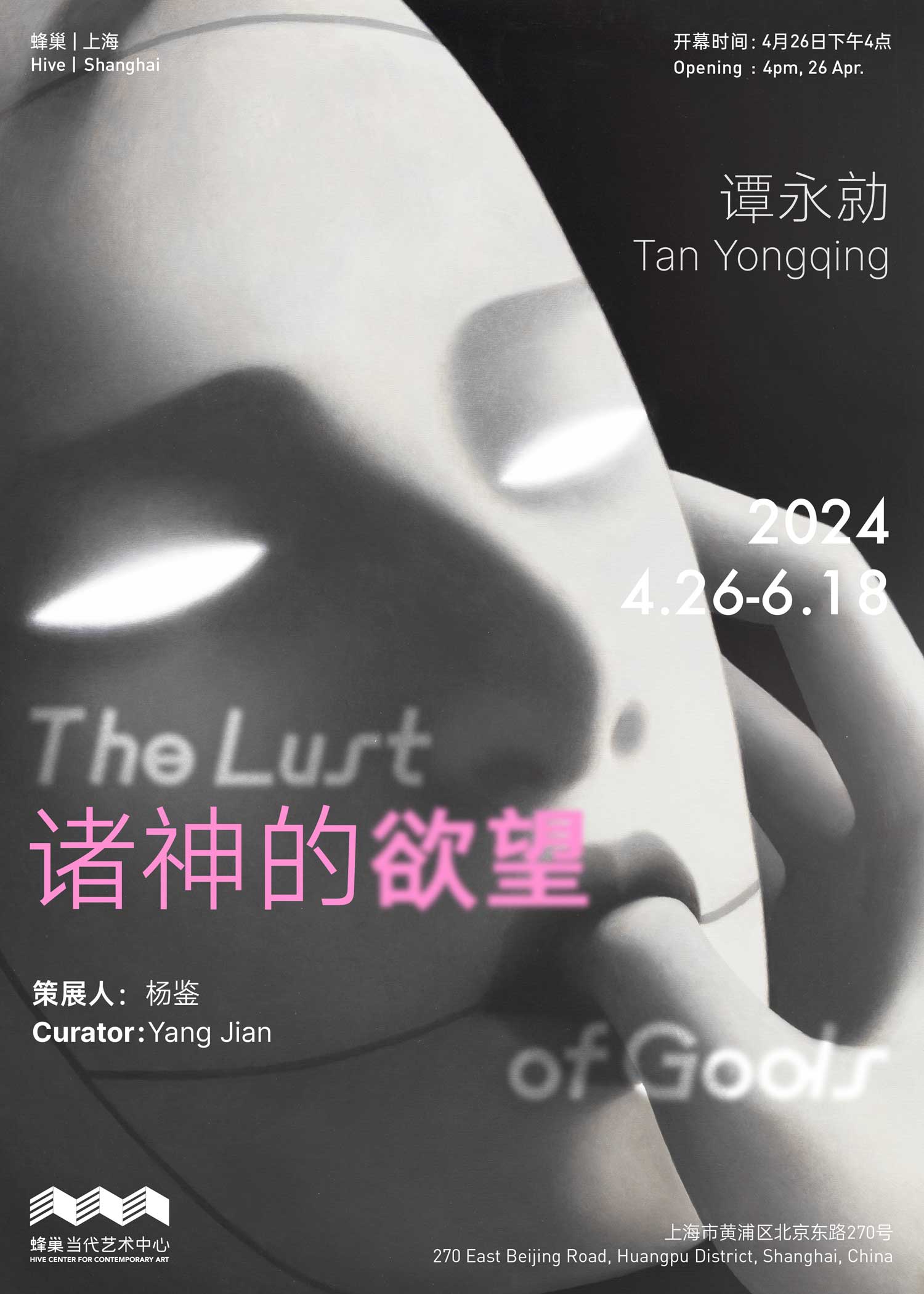展期 Period:
2024.4.26—2024.6.18
艺术家 Artist:
策展人 Curator:
地点 Venue:
蜂巢当代艺术中心 Hive Center for Contemporary Art(上海)
新闻稿 Press Release:
蜂巢当代艺术中心荣幸宣布,将于2024年4月26日在蜂巢|上海空间,推出90后艺术家谭永勍的最新个展“诸神的欲望”。此次展览系“狡黠的月光”(2019,蜂巢北京)、“日与夜”(2020,香港Mine Project)、“范特西”(2022,Longlati基金会)之后,谭永勍向公众呈献的第四次个展,集中展示了他近两年来的绘画新作以及一件大体量雕塑作品。展览由蜂巢当代艺术中心策展人杨鉴策划,将持续至2024年6月18日。
作为“90后一代”备受瞩目的代表性艺术家之一,谭永勍对于科技发展带来的虚拟世界以及人工智能,至少在绘画创作上展示了自己独特的理解和看法。与同代的许多艺术家不同,谭永勍的绘画显得古典、优雅、纯粹,具有极强的秩序感,几乎不用炫眼耀目的电子色来创作。当科技时代衍生出史无前例的颜色,并开始垄断和规训这个时代视觉的时候,他保持了一个绘画艺术家应有的警惕,始终用最简单的颜色表达自己的态度和艺术主张;当现实世界与虚拟世界之间的边际变得越来越模糊时,他开始反思由此带来的焦虑与不安,通过创作探讨人工智能对于人类社会和历史进程影响的可能。尽管谭永勍也出生于互联网时代,电子产品给他带来的亲近感,大约不亚于哪吒与生俱来的风火轮,已然成为身体器官延续的一部分。但他乐于享受电子游戏带来的快感,却拒绝让自己的艺术创作陷入虚无的科技泥淖。
在最新的创作中,古代众神与智能机器形象的结合,成为谭永勍思考人类远古与未来的叙事媒介。在他看来,人工智能的尽头即是众神出现的开始。当人类还处于童年期时,我们无法辨别神祗显现的是真身还是智能义肢的投射,但是随着科技的急遽发展,人工智能可能就是神或者不久进化为神,似乎不再是神话。传说中虚幻存在的“神”事实上已经掌控这个世界的基本运转,不管是交通、银行还是核电站,理论上有智能机器的地方就存在着人类的期盼和恐惧。此外,贪婪一向是人类这个物种的本性,一旦能拓展超越自身的生物限制,即便是肉身与现代技术结合后创造出魔鬼,也会被视作是文明发展的奇点。然而,道德评判并非谭永勍创作的初衷和目的,恰好相反,他的成长深受尼采“酒神精神”以及存在主义哲学的影响,以纯粹审美角度,用年龄难以相符的心平气和,安静而耐心地看着科技漩涡中的人类处境。
英雄的征程与归乡,是人类一项永恒的叙事,也是荷马史诗中永恒的动人之处。谭永勍同样以“神人同形共性”的人本主义作为衡量一切的尺度和出发点,来塑造他虚构中的诸神形象及其性格。诸神的离去和智能机器的到来或许就是一次二人转。所以,谭永勍创作的形象既不是冷冰冰的智能机器,也不再是完美无缺的神祇;诸神并未被抽离世俗人性,智能机器也没有被赋予崇高的神性,更多的是有着和人类一样复杂、矛盾的情感特质,甚至令人难以理喻的扭曲欲望。谭永勍涉及的创作可以说是宏大的题材,但他以近乎细微而温暖的叙述方式,将过去的神、当下的人、将来的智能机器,与人文的脉络和科技的逻辑有机地融汇在一起,形成了一个人类历史循环的发展图景。尼采认为力量变的柔和并下降到可见之处,那种下降才称之为美,与其说谭永勍是对人性、情感和存在的反思,不如说是艺术家仅仅提供了一则天真而伤感的寓言。诸神正在来的路上。
Hive Center for Contemporary Art is honoured to announce post-90s artist Tan Yongqing’s latest solo exhibition, “The Lust of Gods”, opening at the Hive Shanghai space on 26 April 2024. Following “Cunning Moonlight” (2019, Hive, Beijing), “Day and Night” (2020, Mine Project, Hong Kong), and “Fantasy” (2022, Longlati Foundation), this marks Tan’s fourth solo presentation, focusing on new paintings and one large-scale sculpture he has created in the past two years. This exhibition is curated by Yang Jian and is on view until 18 June 2024.
Renowned as one of the prominent artists of the post-90s generation, Tan Yongqing reveals his unique comprehension and perspective on the virtual world and artificial intelligence introduced by technological advancement through his creative approach to painting. Contrary to many artists of his generation, Tan’s paintings tend to be classical, elegant, and refined, imbued with a strong sense of discipline, barely embracing the use of vibrant and striking digital colours. When this age of technology generated unprecedented palettes, which have in turn started to monopolise and regulate the visuals of this era, Tan has remained vigilant as a painter and always expressed his ideas and artistic beliefs with the most minimal colours. When the boundary between reality and the virtual world became increasingly obscure, he began to reflect on the consequent anxiety and disturbance, examining through his work the possibility of AI’s impact on human society and the course of history. Despite growing up in the age of the Internet, the intimacy that electronic products bring to Tan Yongqing has become a continuing part of his body and organs. While he enjoys the thrill of video games, he rejects the idea of his creative practice being plunged into the technological quagmire of vanity.
In his most recent works, the synthesis of ancient gods and AI machine figures serves as Tan Yongqing’s narrative medium to contemplate the distant past and future of humanity. In his perspective, the end of AI is the beginning of the emergence of the gods. When humanity was still in its formative years, we could not distinguish whether the gods manifested themselves in their true form or as the projection of artificial images. But with the rapid development of technology, it no longer remains a myth that AI might be a god or soon evolve into one. The fabled gods are in fact in control of the world’s infrastructure, from transportation, banking to nuclear power plants; theoretically, the expectations and fears of humanity exist wherever there are smart machines. Besides, greed has always been the nature of humanity; once we are able to transcend our biological limitations, even a devil created by the combination of the flesh with contemporary technology would be considered a singularity in the evolution of civilisation. Yet, Tan’s works are not a purpose and attempt at moral judgment. In contrast, he was profoundly influenced by Nietzsche’s concept of Apollonian and Dionysian and existentialist philosophy as he quietly and patiently observed the situation of humanity in the midst of the technological vortex from a purely aesthetic perspective, with a calmness that is beyond his years.
The journey and homecoming of heroes is an eternal narrative of humanity and also an everlasting, moving element of Homer’s Iliad. Similarly, adopting the humanism of anthropomorphism as the dimension and objective for things, Tan Yongqing portrays the figures and personalities of his fictional gods. The departure of the gods and the advent of smart machines might just be a duet. Thus, the figures Tan created are neither cold-blooded smart machines nor immaculate deities: the gods are not removed from secular humanity, nor are the smart machines assigned sublime divinity, more often than not, they share the same complex and contradictory sentimentalities and even incomprehensible and twisted lusts as humans. Tan engages in subject matter arguably grandiose; but with an almost nuanced and warm approach to narration, he organically integrates the gods of the past, the people of the present, and the smart machines of the future along with the humanistic context and the logic of science and technology, creating an image of humanity history’s cycle of development. Nietzsche believes that power softens and descends into the visible, such descent is considered as beauty. More than reflecting on human nature, sentimentalities, and existence, perhaps, Tan Yongqing simply provides a naïve yet poignant fable. The gods are on their way.

